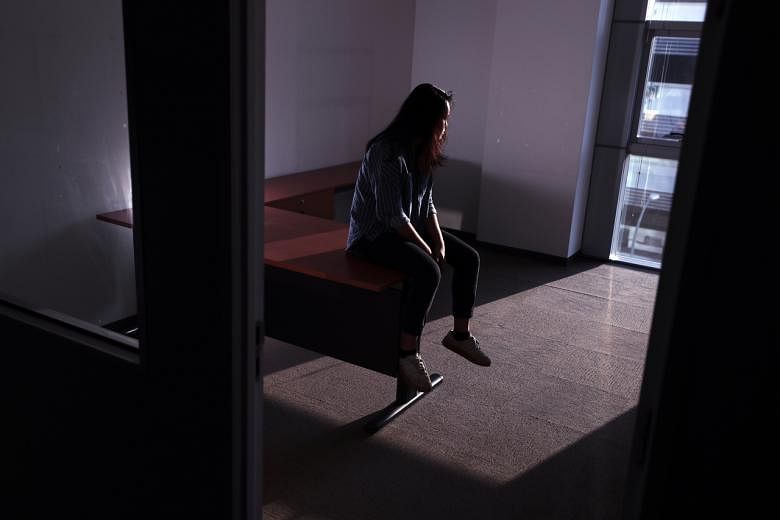SINGAPORE - Counsellors in Singapore are facing burnout and high demand amid the Covid-19 pandemic as more individuals seek therapy to cope with mental health concerns and stress related to employment and family relationships.
Representatives from five firms here said the number of new cases had spiked by an average of 20 per cent from pre-pandemic years, with one firm reporting that its client numbers had tripled between August last year and last month, compared with the corresponding period over 2018 and 2019.
Mr Tony Ong, senior therapist and manager of counselling services at Counselling and Care Centre, said it had 1,300 more sessions for approximately the same number of clients as in the previous financial year.
He quoted the example of a client, a single woman living on her own and grieving the loss of her parents before the start of the pandemic. She struggled with isolation and erratic work at the start of the pandemic as well as increasingly frequent mood swings.
She had difficulties coping with the changes and pressed the counsellor to meet her. The client learnt to cope better after the counsellor increased the frequency of their meetings.
"Some of the clients do not feel safe when they have virtual sessions while working from home; that is because of the possible adverse effect it can have on their relationships at home. Further, clients who want to keep their struggles with mental health issues from their family members may be at risk of being discovered," Mr Ong said.
The firms said the issues counsellors face include difficulty finding a private space to speak with clients when conducting virtual sessions, and identifying clients' body language cues, such as twiddling of thumbs and tapping of toes in anxiety, through a screen.
Care Corner Counselling Centre's principal counsellor Jonathan Siew said that navigating sessions during the pandemic has also taken a toll on counsellors' well-being.
"Counsellors, like all Singaporeans, have to cope with ongoing adjustments at home and work, and they are exposed to the same kinds of stressors that have affected almost everyone," he said.
"Despite such added pressure, they have to ensure that the impact of such distress does not affect their ability and capacity to offer help to clients."
Mr Siew said some counsellors have been experiencing distress as they are unable to respond in time to clients whose problems might deteriorate if they do not receive help on time, for instance if clients are undergoing marital conflict which could intensify without timely intervention.
He said Care Corner has been referring 20 per cent to 30 per cent of its callers to other counselling centres operated by social service agencies.
To ensure the well-being and emotional stability of counsellors, Care Corner has been conducting regular sessions to check in with the counsellors and supervising their workload.
The chief well-being officer of the Singapore Counselling Centre, Mr John Lim, said the centre has received more inquiries, not only from individuals but also from organisations asking about employee assistance programmes.
Mr Lim said there has been a demand for more counsellors to join the firm as a result of the higher volume of cases.
The centre places a cap on the number of sessions each counsellor can take in a day, and has put in place 30-minute breaks in between sessions for counsellors to rest and prepare for their next session.
"Overall, it is important for counsellors to practise self-care and for the agency to ensure that the counsellors' well-being is not compromised by the work arrangement, as the counsellors' emotional stability is the most critical factor influencing the outcome of their work," Mr Lim added.
Counsellor Chua Sze Siong from Mindful Bear, a specialist counselling centre for children, said his colleagues check in on one another and redistribute cases to prevent burnout.
Mr Chua advised others to plan, prioritise and take time to pause between their tasks.
He said: "Work is work, at end of the day we need to de-role to get in touch with our own feelings. I make it a point to change my clothes after my session before making my way home. This is my way of preparing myself physiologically to go home and get out of the counsellor's role."
Helplines
• National Care Hotline: 1800-202-6868 (8am - 12am)
Mental well-being
• Institute of Mental Health's Mental Health Helpline: 6389-2222 (24 hours)
• Samaritans of Singapore: 1800-221-4444 (24 hours) /1-767 (24 hours)
• Singapore Association for Mental Health: 1800-283-7019
• Silver Ribbon Singapore: 6386-1928
• Tinkle Friend: 1800-274-4788 and www.tinklefriend.sg
• Community Health Assessment Team 6493-6500/1 and www.chat.mentalhealth.sg
Counselling
• TOUCHline (Counselling): 1800-377-2252
• TOUCH Care Line (for seniors, caregivers): 6804-6555
• Care Corner Counselling Centre: 1800-353-5800
Online resources
• mindline.sg
• My Mental Health
• Fei Yue's Online Counselling Service


